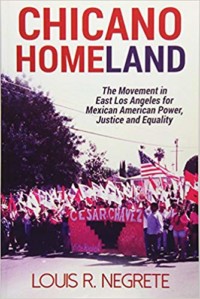Title: Chicano Homeland – The Movement in East Los Angeles for Mexican American Power, Justice and Equality
Author: Louis R. Negrete
Publisher: CreateSpace
ISBN: 978-1519355263
Pages: 148
Genre: Non-Fiction
Reviewed by: Barbara Bamberger Scott
Pacific Book Review
A comprehensive history of Mexican American initiatives in a city that has been a fertile seedbed of change, Chicano Homeland provides a needed and fascinating view.
Written by Louis R. Negrete, a Chicano activist who has long been an active player in Mexican American politics, protest and change, the chronicle begins during World War II when Mexican Americans in East Los Angeles were subjected to the same kind of racist pressures that were afflicting Japanese Americans. The author became aware of this bias against his people when at age nine, he saw his uncle chased by sailors and policemen. Though Mexican Americans served honorably in the military during WWII, garnering more Medals of Honor than any other minority group, attitudes did not change after the war, despite the hopes of returning soldiers. The 1950’s saw a growth of activism, with such organizations as the Mexican American Political Association working to improve conditions for immigrant people.
In the 1960’s, the general impulse towards change affected Mexican Americans as much as other Americans. Education became a focus of activism with the formation of the Association of Mexican American Educators, The Educational Issues Coordinating Committee, and other offshoots. Chicanos joined forces with anti-war protestors and with followers of Martin Luther King working non-violently for civil rights for all. Legendary activist Cesar Chavez galvanized Chicanos and others in the struggle for farmworkers’ rights to unionize. It was a time of excitement and incitement that has continued in various forms – political, educational, and social – to this day in East Los Angeles, where the current population is more than 90% Latino.
Author Negrete makes clear, the struggle is far from over. As a former Director of Project Head Start and a founding professor of Chicano studies at California State University, he combines his historical erudition with a serious exhortation to his readership: “A new Mexican American movement must become an identifiable yet independent force in electoral politics.” He advises that such a movement should avoid what he calls “hectic activism” – busy people holding endless meetings, exhausting their energies on small battles while the war goes on. This is increasingly important as thorny issues like DACA and ever-growing concerns regarding America’s southern border are before us. He suggests a voting bloc that reaches across party lines, motivates the poor, and encourages all segments of the population to join and to exercise their democratic rights.
A detailed focus on one specific area turns to a more universal view as Negrete urges like-minded people to engage with concerned Chicanos, rise up once more, and speak with one voice. Chicano Homeland brings into perspective these very important issues in a book geared to a wide reading audience.



Follow Us